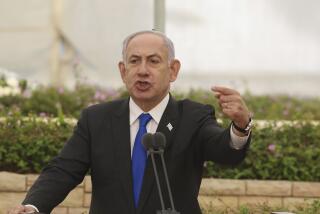Syria has received advanced missiles from Russia, Assad says
- Share via
BEIRUT -- Syria has received its first batch of advanced air-defense missiles from Russia, Syrian President Bashar Assad told a Lebanese television station, according to reports surfacing Thursday.
If true, Assad’s assertion would seem to edge Syria closer to a confrontation with neighboring Israel, which has said it would not allow the deployment of the sophisticated S-300 anti-aircraft system. The state-of-the art air-defense missiles would pose a threat to Israeli warplanes, which have already been publicly linked to three bombing attacks on Syrian targets this year.
“Syria has received the first batch of Russian S-300 anti-aircraft missiles,” Assad told an interviewer from Lebanon’s Al Manar television, according to an account in the online version of Beirut’s Al Akhbar newspaper. “The rest of the load will arrive soon.”
[Updated, 2:45 p.m. May 30: However, official transcripts of the interview from both Al Manar and Syrian state media do not contain those comments. Asked if the missiles were already in Syria’s possession, or en route, Assad declined to answer directly.
“It is not our policy to talk publicly about military issues in terms of what we possess or what we receive,” Assad said, according to the official Syrian press agency transcript. “Neither Netanyahu’s visit nor the crisis and the conditions surrounding it have influenced arms imports.”
He was referring to Israeli Prime Minister Benjamin Netanyahu’s recent visit to Moscow. The Israeli leader reportedly urged Moscow to cancel delivery of the S-300 system, but came away without any assurances.
“All of our agreements with Russia have been implemented, some have been implemented during the past period and, together with the Russians, we will continue to implement these contracts in the future,” Assad said, leaving ambiguity about the fate of the S-300 missile systems.
Israeli officials have said that the S-300 is a complex system that requires various stages to be operational. That raises the possibility that some part of the order might have arrived in Syria without the system being fully functional yet.]
The full interview is to be aired later on Al Manar TV, which is affiliated with Hezbollah, the Lebanese militant group closely allied with Assad’s government.
In the interview, according to the Al Akhbar account, Assad also vowed that the Syrian military would “respond immediately to any new Israeli aggression on Syrian territory.”
The Syrian government, Assad said, “will not stand in the way of any Syrian groups who want to wage war to liberate the Golan Heights,” referring to the strategic plateau seized by Israel in 1967.
There was no immediate comment from Israel on Assad’s reported statements.
Earlier this week, Russia said it planned to proceed with deliveries of the S-300 system to Syria, but Moscow did not specify when the weapons would be shipped or whether the missiles had already been transferred.
The Russian Foreign Ministry said the missiles would act as a deterrence to “hotheads” determined to intervene in the Syrian conflict.
Moscow acted after the European Union failed to renew its arms embargo on Syria. France and Britain are considering providing weapons to the Syrian rebels, but not before Aug. 1.
Israel had asked Russia to cancel the S-300 missile shipments. On Tuesday, Israel’s defense minister, Moshe Yaalon, said it would “know how to act” if officials detected that the weapons had been shipped to Syria.
The various reports of new weaponry headed to Syria -- both to the government and to the rebels -- have complicated U.S.-Russian efforts to sponsor a Syrian peace conference in Geneva. The Syrian opposition insists that Assad must go as a result of any negotiations, a stance rejected by Damascus.
In fact, Assad may seek a third term in elections scheduled for next year, Syria’s foreign minister, Walid Muallem, said this week.
In the television interview, the Syrian president also reportedly said that the military balance of power in Syria’s conflict had turned in the government’s favor.
Syrian rebels -- with the financial and logistical aid of the United States, Turkey, Saudi Arabia, Qatar and other allies -- have waged a more than two-year war to oust Assad, who is backed by Russia, Iran and Hezbollah. The government has made some military advances in recent weeks, but rebels still hold sway over vast stretches of northern and eastern Syria.
ALSO:
France holds its first same-sex marriage
World’s oldest complete Torah believed found in Italy
Pakistani Taliban leader believed killed in U.S. drone strike
More to Read
Sign up for Essential California
The most important California stories and recommendations in your inbox every morning.
You may occasionally receive promotional content from the Los Angeles Times.










